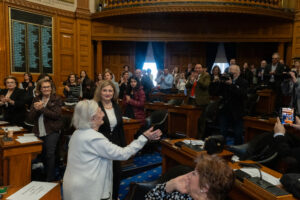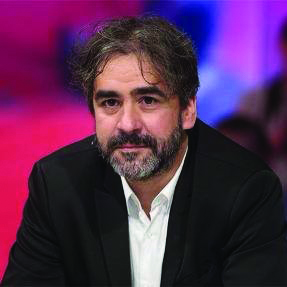FRANKFURT, Germany — Many journalists, too many, have been arrested and jailed in Turkey and for political reasons. The numbers run into the hundreds. Deniz Yücel is one of them; he was “not the first to be arrested illegally, but was the first to be freed illegally.”
This is how he summed up his special case during a meeting held on June 5 at the Literaturhaus in Frankfurt am Main, Germany. Titled, “Freedom is something that one does,” the event was organized by the Friedrich Naumann Foundation. The moderator was Martin Wiesman, and Yücel’s dialogue partner was Doris Akrap, journalist and editor of the Tageszeitung (TAZ) newspaper.
Indeed, the case was in many ways unique. Yücel is a German citizen of Turkish descent and was working as a correspondent for the German paper Die Welt when he was arrested in February 2017. He was kept in prison for one year, 290 days of those in solitary confinement; he was released on February 16, 2018. The state attorney had just presented formal charges, accusing him of spreading propaganda for a terrorist organization (the Kurdish PKK) and of incitement to hatred. If convicted, he could be sentenced to 4-18 years. A date for the trial was set for June, but there was no condition set that he must stay in Turkey. He immediately left for Germany. He would not return for the trial.
In this sense, he was the first to be released illegally. His freedom came not as a result of an orderly trial and acquittal, but in response to an international campaign, #FreeDeniz, launched by Akrap, who grew up with Yücel near Frankfurt. The campaign organized demonstrations, car rallies, concerts, readings in local bookstores, petitions and open letters. As Akrap noted, the moment was propitious, since Turkey was at the center of attention, and the case was a lead item in major press for weeks on end.
The German government intervened, in the person of then-Foreign Minister Sigmar Gabriel, and when in summer 2017 Berlin threatened to block Hermes export credits, the potential economic danger convinced Ankara to let him out. Eager to maintain access to the European Union (and even join one day), Turkey couldn’t risk such a conflict with Germany, Yücel said.
On the personal level, he stressed the importance of the solidarity campaign, which gave him the moral support to resist (even when tortured) and to smuggle articles out of jail. Although, he reported, some colleagues feared that publication would do more damage than good, he reasoned, “The reason I’m here is that I am a journalist, because of my articles. If their aim is to silence me, then all the more important to break the silence and publish.”









